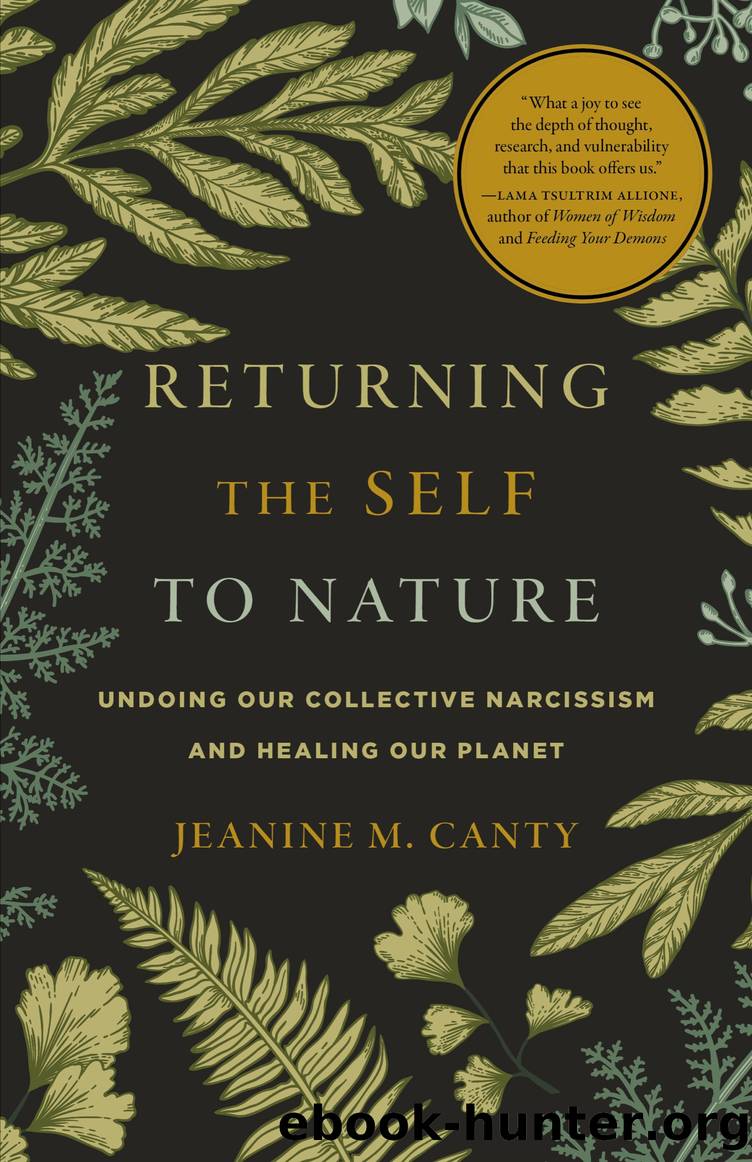Returning the Self to Nature by Jeanine M. Canty

Author:Jeanine M. Canty [Canty, Jeanine M.]
Language: eng
Format: epub
Publisher: Shambhala
Published: 2022-10-11T00:00:00+00:00
THE FALSE SELF REVISITED
Previous sections of this book introduced us to the idea of the false self. While the original notion of a false self came out of the field of pediatric psychoanalysis and focused on child-parent relationships, an ecopsychology perspective allows us to extend the concept to show how we develop in order to fit into Western global corporate culture. Living within a culture that tells us we have more worth if we are wealthy, physically attractive, and generally doing better than others breeds us to be competitive and to constantly acquire things and experiences that we do not necessarily want or need. Essentially we are presented with an archetype of who we should be that is set by a nonsensical standard.
Although the ecopsychology perspective on the false self applies equally to adults, it does not negate the importance of childhood development in this process. Early childhood is an extremely important window in which we can learn to trust ourselves, other people, and nature. Early childhood is when we begin to develop skills and learn what we like and what we are good at, and when we become aware of the beauty, joy, and awe of our momentary experiences with life. With the constant pressure from formidable systems of Western civilization that breed insecurity, mistrust, disconnection, standardization, and constant distraction from our direct experience, many of us either never develop that healthy sense of self in childhood or we grow out of alignment with it as we age. The result is the development of a false self that constantly focuses on the outward needs peddled to the individual by our superficial society.
The narcissistic personality and the false self correlate closely. Though not everyone who exhibits a false self is narcissistic, people who are extremely narcissistic have false selves. As you may recall, the wounding they received in early childhood caused them to create an alternate reality where they are in control and have safe boundaries. Things that are threatening or do not conform to the narcissistâs fixed categories of good and right are not allowed to enter their world. When someone or something violates the narcissistâs false reality, they are expelled from it by the narcissist. In addition, the narcissist is highly insecure and has little ability to handle critique, which they counterbalance with an overblown sense of self, arrogance, and a constant need to feel special. The narcissistâs fragility results in a false selfâa fictitious reality where they are the center of everything. The narcissist often has no to low awareness of their dynamic and sees others, rather than themselves, as being problematic.
Similar to the narcissist, many of us living within a capitalistic Western corporate society that keeps us hyperfocused on image, competition, and consumption feel comfortable prioritizing our desire for wealth and other forms of status above others. We have collectively become comfortable with the thought that we are the center of the universe, that our needs and stories are more important than anything else. Even those
Download
This site does not store any files on its server. We only index and link to content provided by other sites. Please contact the content providers to delete copyright contents if any and email us, we'll remove relevant links or contents immediately.
Should I Stay or Should I Go? by Ramani Durvasula(7652)
Why We Sleep: Unlocking the Power of Sleep and Dreams by Matthew Walker(6699)
Fear by Osho(4727)
Flow by Mihaly Csikszentmihalyi(4687)
Rising Strong by Brene Brown(4448)
Why We Sleep by Matthew Walker(4433)
The Hacking of the American Mind by Robert H. Lustig(4375)
How to Change Your Mind by Michael Pollan(4355)
Too Much and Not the Mood by Durga Chew-Bose(4337)
Lost Connections by Johann Hari(4171)
He's Just Not That Into You by Greg Behrendt & Liz Tuccillo(3890)
Evolve Your Brain by Joe Dispenza(3668)
The Courage to Be Disliked by Ichiro Kishimi & Fumitake Koga(3487)
Crazy Is My Superpower by A.J. Mendez Brooks(3398)
In Cold Blood by Truman Capote(3374)
Resisting Happiness by Matthew Kelly(3337)
What If This Were Enough? by Heather Havrilesky(3308)
The Book of Human Emotions by Tiffany Watt Smith(3300)
Descartes' Error by Antonio Damasio(3270)
